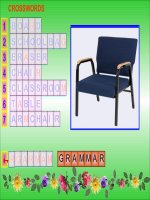GRAMMAR PRACTICE 6 ADVANCED LEVEL
Bạn đang xem bản rút gọn của tài liệu. Xem và tải ngay bản đầy đủ của tài liệu tại đây (2.04 MB, 3 trang )
GRAMMAR
PRACTICE FOR ADVANCED LEARNERS
EMPHASIS
CHANGING WORD ORDER TO CHANGE FOCUS
06
¢ Passive
Passive constructions vary the way information is given in a sentence, putting more
emphasis on what comes first.
- All roads to the north have been blocked by snow.
¢ Fronting and inversion
Inversion here refers to changing the normal word order in the sentence so that a
prepositional phrase is emphasized before the verb. This also involves putting the verb
before the subject.
- Suddenly down came the rain!
- Up in the air went the balloon.
Fronting involves changing the order of clauses in a sentence and putting first for
emphasis a clause that would usually not be first.
- I don't know where the money is coming from.
- Where the money is coming from, | don't know.
Time phrases can vary in position, and are often put first because the time reference is
important.
- At six o'clock Monica decided to phone the police.
There is a type of may clause introduced by although which can be inverted. It is a
highly formal expression.
- Although it may seem/ be difficult, it is not impossible.
- Difficult as it may seem, it is not impossible.
- Difficult though it may be, it is not impossible.
¢ Cleft and pseudo cleft sentences
These are sentences introduced by it is / it was or by a clause beginning what.
Different parts of the sentence can be emphasized in this way. In speech, stress and
intonation also identify the emphasis.
With itis / it was
- Sue borrowed my bike last night.
- It was Sue who borrowed my bike.
- It was last night that Sue borrowed my bike.
- It was my bike that Sue borrowed.
Sentences with because are also possible.
- It was because I felt ill that I left.
Modal auxiliaries are also possible.
- You can't have read the same book.
- It can't have been the same book that you read.
With what clauses
These are common with verbs such as need, want, like, hate.
- I hate rainy weather.
- What I hate is rainy weather.
- You need a holiday. - What you need is a holiday.
It is also possible to emphasize events, using auxiliary do / did.
- Peter left the windows unlocked.
- What Peter did was (to) leave the windows unlocked.
- They are destroying the environment.
- What they are doing is destroying the environment.
* Clauses beginning all emphasize ‘the only thing’
- I only need another €15.
- AILT need is another €15.
Adding words for emphasis
* Own
This intensifies possessive adjectives.
- It was my own idea.
* Very and indeed
Very can be used emphatically to mean ‘exactly / precisely’
- At the very same moment, the telephone rang.
Very... indeed is another way of intensifying adjectives.
- It was very cold indeed.
Emphasizing negatives
Ways of emphasizing not include: at all, in the least, really.
- It was not at all cold.
- It was not cold at all.
* In the least / slightest usually adds bit if used before an adjective.
- I wasn't interested in the slightest
- | wasn’t the least bit interested.
* No and none can be emphasized by atall and whatsoever.
- There were none left at all.
- There were no tickets left whatsoever.
* The
The can emphasize uniqueness. It is heavily stressed in speech.
- Surely you are not the David Beckham, are you?
Question words ending in -ever
These add an air of disbelief to the question.
- Whatever are you doing?
- Whoever told you that?
Auxiliary do
This can emphasize the verb, and is stressed in speech.
- I dé like this film! It’s really great!
It is also used in polite forms.
- I dé hope you'll come again! D6 sit down!
Adverbs and adjectives
A large number of adverbs and adjectives are used to add emphasis.
Common examples are:
-
lactually went inside one of the pyramids.
It is by no means certain that the match will take place.
Some people were even wearing two pullovers, it was so cold.
Her performance was sheer magic!
- This book is utter nonsense!
The following examples are only possible with adjectives which express an absolute
opinion (non-gradeable adjectives).
- It was absolutely fantastic!
- The third exam question was quite (completely) impossible.
- This guide book is utterly useless.
- You were simply wonderful!
- Don’t cook the meat any more. It’s just right!
Echoing phrases with so
These express agreement
A: This is the book you are looking for.
B: So itis!
Other means:
* Time phrases
Common examples are day after day; time and time again; over and over again; day
in, day out
- David reads the same books over and over again!
* Repetition of main verb
- I tried and tried, but it was no use.
* In the repetition of a phrase with a possessive, it is possible to omit the first
mention of the noun and use a possessive pronoun.
- Their marriage was a successful marriage.
- Theirs was a successful marriage
PRACTICE
I. Complete each sentence with a phrase from the list below.
the least - bit - waited and waited - as it may seem - by no means - not at all
what we did - time and time again — can’t have been - none at all - do think
1. I know you’re busy, but I ....do_think.....you could have helped me with the
decorating.
2. [U*S........................ certain that the president will be re-elected.
3. You may have lots of restaurants where you live, but there are.................. in this part
of town.
4. Itold you..................... about the leaking pipes, but you wouldn’t listen.
5. You don”t seem...................... interested in my problems!
6. Strange........................- the bus 1s actually faster than the train.
7. In the end.,.......................... was to call a plumber.
ĐO... ..... 2... Q.0
HH
ng. all day, but Chris never turned up.
9. Nicola WaS..........................--<5 bothered by our turning up so late.
1Ø. It.......................... Jim that you saw; he is in Germany at the moment.
II. Complete the text with the words from the list below. Use one word in each gap.
again - all - as — at - is - utter - what - whatever - whatsoever - why
What really makes me furious is the sort of language used in official letters.
For example, I can't make any sense of this letter from the council (1) at all. It's (2)
KH ke. nonsense, if you ask me. (3) ...............the council can't write in plain English is
beyond me. (4).............. I really can't stand is this kind of long-winded, complicated
English. In my opinion, what they're doing (5)................ systematically destroying the
language with all this new jargon - ‘input, ‘time window’, ‘feasibility study’ (6).................. are they talking about? (7)................. we get is the same meaningless drivel
over and over (8)............... Listen to this: "Difficult (9)............... it may be for all parties
concerned, this is the most viable solution on offer.’ I have no idea, none (1 Q).............. ›
what that means. Can nobody write in plain English nowadays? Or is there something
wrong with me?
III. Complete the second sentence so that it has a similar meaning to the first
sentence, using the word given. Do not change the word given.
1. The car doesn't need anything else except new tyres.
NEEDS
All ....the car needs is... new tyres.
2. Liz didn't worry at all about her exams.
BIT
L1z wasn”t the......................... about her exams.
3. The person who told me about the hotel was Keith.
WHO
im...
told me about the hotel.
4 [had spent every last penny of my money.
ABSOLUTELY
lan...
whatsoever.
5 Although the ticket may seem expensive, it is good value for money. THOUGH
EXP€TSIVG.......................-- c2 the ticket 1s good value for money.
6. I really hate lukewarm food.
STAND
What Ì............................-..<<<- lukewarm food.
7. In the end Martha went to the police.
WAS
In the end what M artha....................... to the police.
8. I think you must have seen a ghost.
THAT
im...
you saw.
9. Her car was the last car you'd expect to be stolen.
VERY
Hers.........................------<-- you'd expect to be stolen.
10. The accident happened because someone was very careless.
CAUSED
SNCCL.... .................... happen
IV. Underline the correct word or phrase to complete each sentence.
1. Don’t worry. I’m none at all / not at all tired.
2. I thought that speech was utter/ utterly rubbish.
3. It was because / why the car broke down that we missed our plane.
4. A: You are sitting on my hat! ~ B: SoamI/So Iam!
5. The sea was so rough that actually / even the experienced sailors were seasick.
6. Whatever/ Why ever are you looking at me like that for?
7. | would like to make it quite / simply clear that we are just good friends.
8. This is my very private / very own computer.
9. On this course, we absolutely expect / do expect you to work hard.
10. There were warnings, but nothing whatsoever/ nothing simply was done.
V. Read the dialogue and decide which option (A, B or C) best fits each gap.
Jane: Well, did you see Western Warrior at the cinema?
Ben: Yes, and | thought it was very good (1)...B... A lot of people had warned me that
the plot got a bit far-fetched, but I didn’t notice anything like that (2)........ What about
you?
Jane: No, I’m afraid I wasn’t interested (3)....... . I find these action films (4).......
unbelievable and over the top. Give me Love on the Danube any day. I could watch that
film (S).........
Ben: Well, I (6).......hope you'll come with me to see The Fall of Julian.
Jane: It hasn’t exactly done very well, has it?
Ben: (7)......... makes you think that? I heard it’s been very popular. Some newspaper
critics have (8)......... suggested itll win several Oscars.
Jane: Well, I think it’s (9)......... not possible to predict these things. You never know
what the judges will go for. Last year I was certain that The Leaping Lady would sweep
the board, but in the end it got no awards (10).........
1. A. certainly
B. indeed
C. surely
2. A. at all
B. by no means
C. absolutely
3. A. whatever
B. slightly
C. in the least
4. A. very
B. sheer
C. utterly
5. A. over and over again
_B whatsoever
C. at the very moment
6. A. would
B. do
C. utterly
7. A. Whatever
B. Whatsoever
C. Whoever
8. A. quite
B. utterly
C. even
9. A. completely
B. simply
C. utterly
10. A. whatsoever
B. at least
C. indeed
ANSWER
KEY
‘ITA
‘TA
Choose the best continuation (a-j) for each sentence {1-10).
1. Allofthe trains were delayed by fog.
2a d...
2. It wasn’t so much my qualifications thatimpressed them.
3. I found that I was spending more time staying late at the office.................
4. I don’t find that the buses are especially late, actually,
—.........
5. Actually, my fridge is in quite good condition, considering its age. ..........
6. | don’t find watching television particularly relaxing..................
7. ve decided to buy anew stereo afterall,
—
.........
8. This book didn’t teach me everything I know about cooking.
..........
9. The flight 1tself didn”t really bother me at all....................
10. Actually I wasn’tin the office yesterday,
eee
a. Where I am going to get the money from is another matter.
b. What I really need is a new washing machine.
c. It must have been my assistant who you dealt with.
HB
VI.
d. It was after 10.00 when I finally got home.
e. What really gets on my nerves is people who push into the queue,
f. It was when I got off the plane that I felt ill.
g. What I did in the end was to ask for a pay rise,
h. It was Sarah who taught me how to make bread,
1. It was because I spoke well at the interview that I got the job.
j. What I like most is a long walk in the country.
VII. Complete each sentence with ONE word
1. You can’t complain. It’s your _—
fault, isn’t it?
2. A: That looks like Janet. ~ B: t1 181111 8xx, it is! My goodness, hasn’t she changed.
hope you haven’t been here long.
3. ’m sorry to keep you waiting. I 5¬
4. It 1s by no................... certain that the prime minister will attend the meeting.
.... I really enjoy in winter is a bowl of hot soup.
6. I searched and .................. for my keys but I couldn’t find them.
2. cu...
xe. you are all going to sleep I can’t quite work out!
8. What the government then ằ
was to raiseincome tax.
9. There isn’t much to eat
¬ we”ve got is some leftovers.
10. Cathy wasn’t the
bit put out when I couldn’t make it to her wedding.









